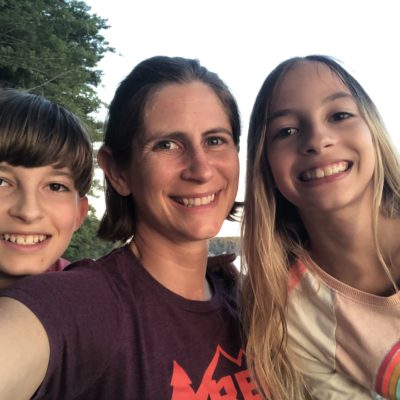
“At the finish line of my second marathon, Chicago, two days before starting my new job at Wheeler.”
Rachel Spaulding
Head of Advancement
The Wheeler School
Throughout my tenure, I’ve noticed an evolution in donor behavior. People want more choice and have less trust in institutions. This will make the job of individual fundraisers harder in many ways, but also more important: donors WILL continue to trust their relationships.
Yet while some donor preferences have evolved, human impulses are eternal: to effect positive change, to leave a legacy, to take care of their chosen communities, to be seen in an admirable light. However the landscape shifts — economically, structurally, socially — those very human motivations will endure and can always be channeled in productive and meaningful ways.
I graduated from college during an economic downturn and got a temp job at my alma mater while I figured out what would come next. I quickly got pulled into areas of my university that I’d never given a thought to as a student, and that temp job turned into a series of roles on the inside of the administration. I quickly discovered how stimulating it is to spend my days surrounded by extremely bright educators trying to do their very best work and make the biggest possible impact on the world. What a privilege!

“On perhaps the most dramatic spot on the Appalachian Trail (which I did not hike).”
My career is proof positive that you do not need to be an extroverted “people person” to be a strong fundraiser. I think it’s common to assume that fundraisers must all just love working with people; I have never felt that way. But early in my career, one of the leaders of the development office where I worked told me something that stayed with me: “You don’t have to like people to love this job. You just have to think people are interesting.” Now THAT resonated. I think people are fascinating, for better or worse – but mostly for the better, happily!
I spent my first several years as a fundraiser doing reunion class fundraising, and I would recommend this job to anyone looking to get started in the field because you get a little bit of everything — volunteer management, solicitation, pipeline development, planning, and strategy.
One year, I worked with a powerhouse 25th reunion class that busted every record that had ever been set; that felt great. The following year, however, I went on to work with a class that had traditionally been a miserable underperformer, with few leadership donors to speak of. That year I worked hard to develop new volunteer leadership and networks to get large numbers of alumni connected back to their alma mater. While that class did not break the record of the class the year before, they absolutely crushed all of their previous giving benchmarks. Even better, over the next five years they had numerous members go onto the board of trustees and other leadership positions, and ultimately broke all records for their 30th reunion (working with a capable colleague other than me). To spark a philanthropic and engagement impulse that had previously been dormant was the most satisfying triumph of my career.
 “In my favorite place (Lake Winnipesaukee, NH) with my favorite people (my twins Julian and Eloise, age 12).”
“In my favorite place (Lake Winnipesaukee, NH) with my favorite people (my twins Julian and Eloise, age 12).”
In the workplace and during life in general, you’ll encounter an array of personalities, to put it mildly. That’s why one of my personal philosophies is the reminder that everyone is a good guy in their own story. When someone’s actions or choices or words strike me as disagreeable or offensive, I try to remember to default to compassion and look for a lens through which their behavior can be interpreted as good or just or right to them.
Defaulting to compassion helps me personally, too. If you hold yourself to extremely high standards on every single task, it will feel overwhelming and you will burn out. Give yourself permission to do B or B+ work where it won’t make a difference so that you can save your bandwidth for the things that need to be A+. Figure out what things can be good enough. Many things can!
Similarly, give yourself permission to make change and build new programs on a three-year timeline. It can be hard to see pathways to improvement or innovation and not charge down them at breakneck speed, but in most situations, you’ll have better results (and greater self-preservation) if you think in layered, incremental stages.

